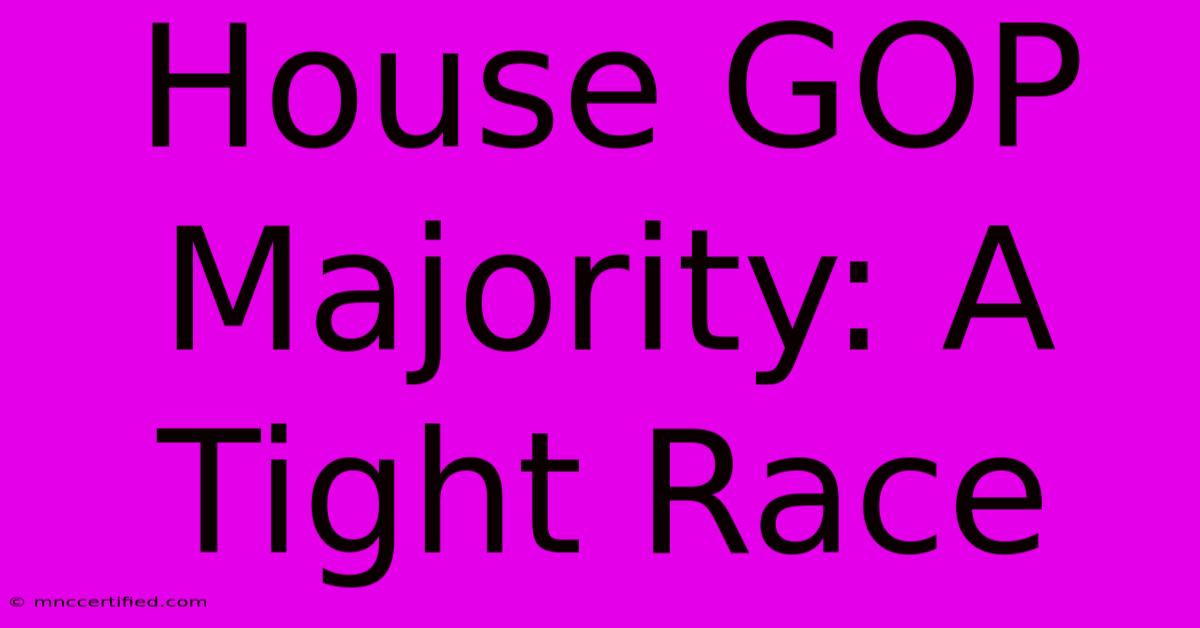House GOP Majority: A Tight Race

Table of Contents
House GOP Majority: A Tight Race – What to Expect in the Midterms and Beyond
The 2024 midterm elections are looming, and the battle for a House GOP majority is shaping up to be a nail-biter. While Republicans are hoping to regain control, the path to victory is far from clear. This article delves into the key factors influencing the race, analyzing the potential scenarios and their implications for the future of American politics.
The Current Landscape: A Narrow Margin
The current balance of power in the House is incredibly delicate. Even a small shift in voter sentiment could dramatically alter the outcome. Several factors contribute to this tight race:
1. Gerrymandering and Redistricting: A Shifting Playing Field
Gerrymandering, the practice of drawing electoral district boundaries to favor one party, has played a significant role in shaping the political landscape. Recent redistricting efforts in various states have resulted in a more fragmented and unpredictable electoral map, making it difficult to predict the final outcome. Understanding the impact of these changes on specific districts is crucial for any analysis of the upcoming election.
2. The Economy: A Major Factor
The state of the economy is always a pivotal factor in midterm elections. Issues such as inflation, unemployment, and overall economic growth heavily influence voter attitudes and choices. If economic indicators remain weak, it could hurt the incumbent party's chances of retaining or gaining a majority. Conversely, positive economic trends could boost their prospects. Analyzing key economic indicators leading up to the election will be vital in predicting its outcome.
3. Candidate Quality and Campaign Strategies
The quality of the candidates running for office significantly impacts election results. Strong, well-funded candidates with compelling platforms have a better chance of success. Campaign strategies, including messaging, advertising, and ground game efforts, also play a crucial role. Analyzing candidate profiles and campaign strategies will provide valuable insights into the race's trajectory.
4. Hot-Button Issues: Social and Cultural Divides
Social and cultural issues, including abortion rights, gun control, and LGBTQ+ rights, are highly polarizing and can strongly influence voter turnout. The intensity of feelings surrounding these issues can sway the election in unpredictable ways, potentially creating unexpected shifts in voter support. Understanding the impact of these divisive issues on different voter demographics is essential for accurate prediction.
Potential Scenarios and Their Implications
Several potential outcomes are possible in the race for a House GOP majority:
-
A Republican landslide: This scenario, while possible, appears less likely given the current political climate. A significant Republican victory would likely lead to a more conservative agenda in Congress, potentially prioritizing tax cuts, deregulation, and stricter immigration policies.
-
A narrow Republican majority: This is a more plausible outcome. A slim majority would likely result in gridlock, with the House GOP needing to negotiate with the Senate and the President to pass legislation. This could lead to a period of political stalemate and compromise.
-
A Democratic hold on the House: This outcome would maintain the current political balance, resulting in continued legislative gridlock. It could also potentially embolden the Democrats to pursue more ambitious legislative agendas.
-
A near-tie: This outcome would create even more uncertainty and political instability, potentially leading to lengthy negotiations and power struggles within Congress.
Conclusion: Uncertainty Reigns
The race for a House GOP majority is exceptionally tight, and the outcome remains uncertain. Multiple factors, from the economy to candidate quality and social issues, will play a critical role in shaping the final result. Closely monitoring these factors in the coming months will be crucial for understanding the potential implications for the future of American politics. The election will undoubtedly have a profound impact on the legislative agenda, influencing policy decisions on various critical issues facing the nation. Staying informed and engaged is vital for every citizen.

Thank you for visiting our website wich cover about House GOP Majority: A Tight Race. We hope the information provided has been useful to you. Feel free to contact us if you have any questions or need further assistance. See you next time and dont miss to bookmark.
Featured Posts
-
Us Embassy Vanuatu Cyclone Damage Report
Dec 18, 2024
-
Helen Rollason Award 25th Anniversary
Dec 18, 2024
-
Juventus Mottas Versatile Star Plans
Dec 18, 2024
-
Vanuatu Earthquake Dozens Dead
Dec 18, 2024
-
Honda Nissan To Merge Nikkei Reports
Dec 18, 2024